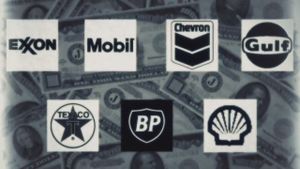Difference between revisions of "Seven Sisters"
(import from WP!) |
m (tidy references) |
||
| (3 intermediate revisions by one other user not shown) | |||
| Line 2: | Line 2: | ||
|wikipedia=https://en.wikipedia.org/wiki/Seven_Sisters_(oil_companies) | |wikipedia=https://en.wikipedia.org/wiki/Seven_Sisters_(oil_companies) | ||
|constitutes=big oil, cartel | |constitutes=big oil, cartel | ||
| − | | | + | |image=Seven Sisters.jpg |
| − | | | + | |description=Big Oil oligopoly |
| − | |||
|start= | |start= | ||
|members=Anglo-Iranian Oil Company, Gulf Oil, Royal Dutch Shell, Standard Oil Company of California, Standard Oil Company of New Jersey, Standard Oil Company of New York, Texaco | |members=Anglo-Iranian Oil Company, Gulf Oil, Royal Dutch Shell, Standard Oil Company of California, Standard Oil Company of New Jersey, Standard Oil Company of New York, Texaco | ||
}} | }} | ||
| − | The ''''Seven Sisters'''' was a common term for the seven multinational oil companies of the "[[Consortium for Iran]]" [[oligopoly]] or [[cartel]], which dominated the global [[petroleum industry]] from the mid-1940s to the mid-1970s. Alluding to the seven mythological [[Pleiades (Greek mythology)|Pleiades sisters]] fathered by the titan [[Atlas (mythology)|Atlas]], the business usage was popularized in the 1950s by businessman [[Enrico Mattei]], then-head of the Italian state oil company [[Eni]]. The industry group consisted of:<ref name=sampson> | + | The ''''Seven Sisters'''' was a common term for the seven multinational oil companies of the "[[Consortium for Iran]]" [[oligopoly]] or [[cartel]], which dominated the global [[petroleum industry]] from the mid-1940s to the mid-1970s. Alluding to the seven mythological [[Pleiades (Greek mythology)|Pleiades sisters]] fathered by the titan [[Atlas (mythology)|Atlas]], the business usage was popularized in the 1950s by businessman [[Enrico Mattei]], then-head of the Italian state oil company [[Eni]]. The industry group consisted of:<ref name=sampson>Sampson, Anthony (1975). The Seven Sisters: The Great Oil Companies and the World They Shaped. New York: Viking Press. ISBN 0-553-20449-1.</ref><ref name="ft">http://www.ft.com/cms/s/471ae1b8-d001-11db-94cb-000b5df10621.html|</ref><ref>http://www.time.com/time/magazine/article/0,9171,946053-1,00.html</ref> |
#[[Anglo-Iranian Oil Company]] (now [[BP]]) | #[[Anglo-Iranian Oil Company]] (now [[BP]]) | ||
#[[Gulf Oil]] (later part of [[Chevron Corporation|Chevron]]) | #[[Gulf Oil]] (later part of [[Chevron Corporation|Chevron]]) | ||
| Line 17: | Line 16: | ||
#[[Texaco]] (later merged into Chevron) | #[[Texaco]] (later merged into Chevron) | ||
| − | Preceding the [[1973 oil crisis]], the Seven Sisters controlled around 85 percent of [[List of countries by proven oil reserves|the world's petroleum reserves]].<ref> | + | Preceding the [[1973 oil crisis]], the Seven Sisters controlled around 85 percent of [[List of countries by proven oil reserves|the world's petroleum reserves]].<ref>https://web.archive.org/web/20100127022854/http://www.timeslive.co.za/opinion/columnists/article272352.ece </ref> Since then, industry dominance has shifted to the [[OPEC]] cartel and state-owned oil and gas companies in emerging-market economies, such as [[Saudi Aramco]], [[Gazprom]] (Russia), [[China National Petroleum Corporation]], [[National Iranian Oil Company]], [[PDVSA]] (Venezuela), [[Petrobras]] (Brazil), and [[Petronas]] (Malaysia). In 2007, the ''[[Financial Times]]'' called these "the new Seven Sisters".<ref name="ft"/><ref>http://seekingalpha.com/article/30922-the-new-seven-sisters-todays-most-powerful-energy-companies </ref> |
{{SMWDocs}} | {{SMWDocs}} | ||
Latest revision as of 13:42, 7 August 2021
(Big oil, Cartel) | |
|---|---|
 | |
| Interest of | Henri Deterding, Red Line Agreement |
| Membership | • Anglo-Iranian Oil Company • Gulf Oil • Royal Dutch Shell • Standard Oil Company of California • Standard Oil Company of New Jersey • Standard Oil Company of New York • Texaco |
| Big Oil oligopoly | |
The 'Seven Sisters' was a common term for the seven multinational oil companies of the "Consortium for Iran" oligopoly or cartel, which dominated the global petroleum industry from the mid-1940s to the mid-1970s. Alluding to the seven mythological Pleiades sisters fathered by the titan Atlas, the business usage was popularized in the 1950s by businessman Enrico Mattei, then-head of the Italian state oil company Eni. The industry group consisted of:[1][2][3]
- Anglo-Iranian Oil Company (now BP)
- Gulf Oil (later part of Chevron)
- Royal Dutch Shell
- Standard Oil Company of California (SoCal, now Chevron)
- Standard Oil Company of New Jersey (Esso, later Exxon)
- Standard Oil Company of New York (Socony, later Mobil, now part of ExxonMobil)
- Texaco (later merged into Chevron)
Preceding the 1973 oil crisis, the Seven Sisters controlled around 85 percent of the world's petroleum reserves.[4] Since then, industry dominance has shifted to the OPEC cartel and state-owned oil and gas companies in emerging-market economies, such as Saudi Aramco, Gazprom (Russia), China National Petroleum Corporation, National Iranian Oil Company, PDVSA (Venezuela), Petrobras (Brazil), and Petronas (Malaysia). In 2007, the Financial Times called these "the new Seven Sisters".[2][5]
An event carried out
| Event | Location | Description |
|---|---|---|
| Iran/1953 coup d'état | Iran | The first of many large scale coups was carried out at the behest of big oil, by the CIA. The report of the inaugural Bilderberg next year termed this "firm Western action in Persia ... [that] had produced successful results." |
Known members
3 of the 7 of the members already have pages here:
| Member | Description |
|---|---|
| Chevron | |
| ExxonMobil | |
| Shell | Biggest Dutch company. Caused trillions in damage due to fracking in Groningen. Convicted worldwide for crimes against locals. Employs hitmen and deep state operatives in African countries. Mislead shareholders for up to $1bn. |
References
- ↑ Sampson, Anthony (1975). The Seven Sisters: The Great Oil Companies and the World They Shaped. New York: Viking Press. ISBN 0-553-20449-1.
- ↑ a b http://www.ft.com/cms/s/471ae1b8-d001-11db-94cb-000b5df10621.html%7C
- ↑ http://www.time.com/time/magazine/article/0,9171,946053-1,00.html
- ↑ https://web.archive.org/web/20100127022854/http://www.timeslive.co.za/opinion/columnists/article272352.ece
- ↑ http://seekingalpha.com/article/30922-the-new-seven-sisters-todays-most-powerful-energy-companies
Wikipedia is not affiliated with Wikispooks. Original page source here